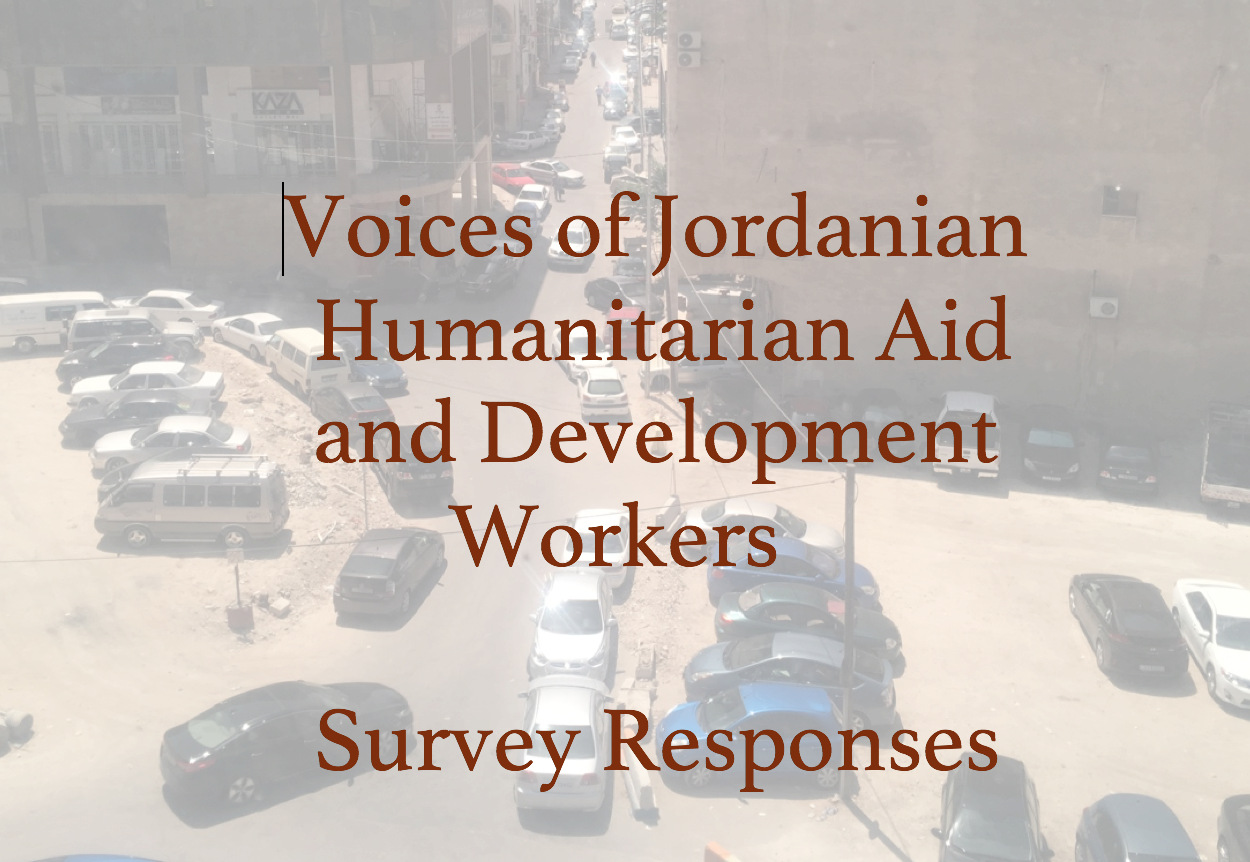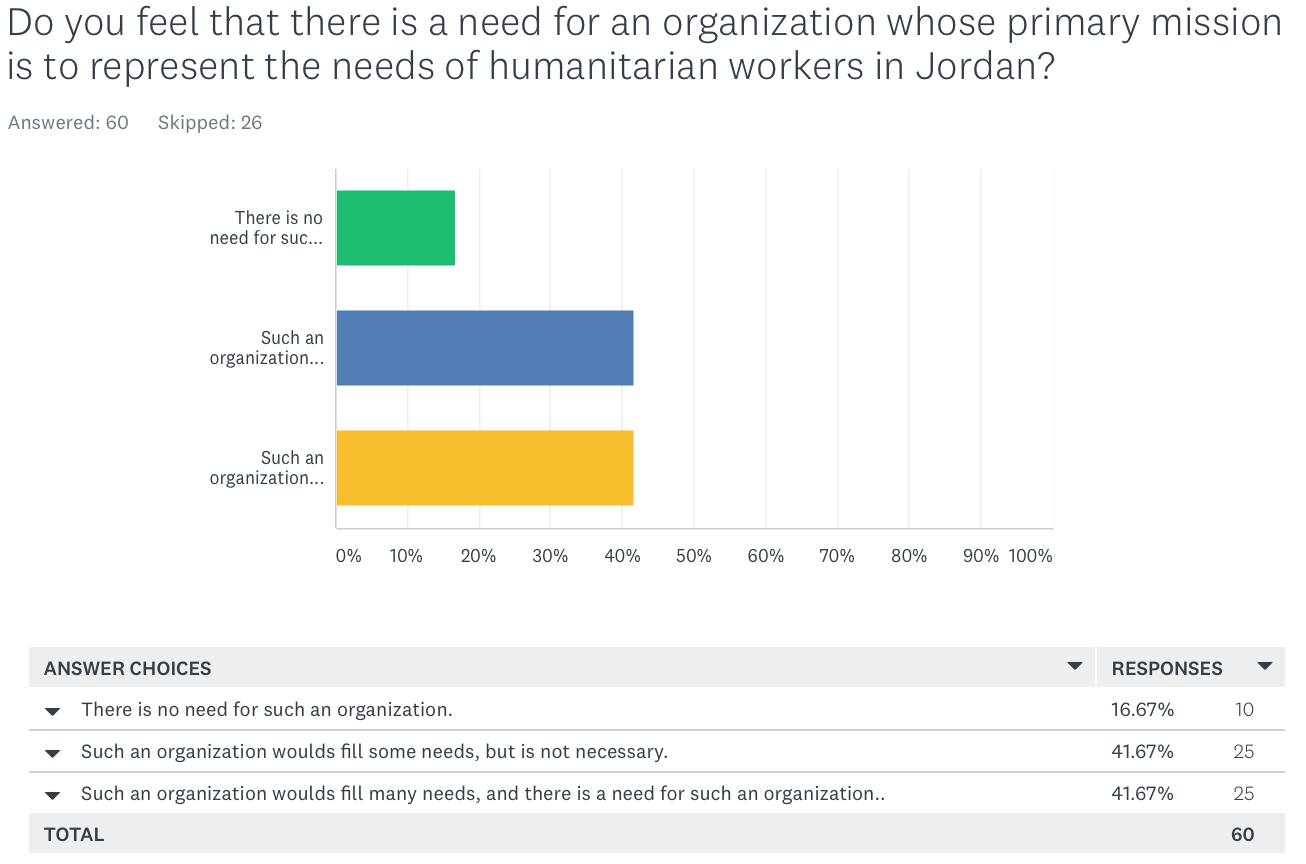“Workers of the world unite…”
A need for an organization representing Jordanian humanitarian workers?
More results from the Jordanian humanitarian worker survey.
Looking back at my time in Amman doing background interviews for my survey, I have many fond memories. First, on a personal level, I want to once again thank the many women and men who took the time to meet with me both while I was in country and in the many months following, agreeing to Skype conversations, emails and follow-up questions.
Secondly, and very critical to this research, some of my strongest memories are when new questions were added to the final draft of the survey based on these many discussions. In one particular interview with a male office staffer employed by a major INGO, we were talking about how many ‘national’ humanitarian aid workers there were throughout Jordan in many scores of organizations. “How do you all communicate, coordinate, and commiserate with each other?” I asked. “Is there any national organization or meeting of Jordanian humanitarians?
The answer was “Not really.” W e went from there to talk about organizations like the Jordan INGO Forum (JIF) and the many intra-organization ‘work groups’ that exist, and how these organizations were more about the overall mission of the INGOs and getting the job done. The focus was not on the workers themselves for the most part. Our discussions ultimately led to adding this question to the survey.
e went from there to talk about organizations like the Jordan INGO Forum (JIF) and the many intra-organization ‘work groups’ that exist, and how these organizations were more about the overall mission of the INGOs and getting the job done. The focus was not on the workers themselves for the most part. Our discussions ultimately led to adding this question to the survey.
“Do you feel that there is a need for an organization whose primary mission is to represent the needs of humanitarian workers in Jordan?”
Worker organizations in Jordan
The labor movement in Jordan has a fairly long history going back to the 1940’s, with a first major watermark being the establishment of the General Federation of Jordanian Trade Unions (GFJTU) in 1954. This article by Ahmad M. Awad at the Phenix Center for Economic & Informatics Studies is a very good summary of the history of the labor movement in Jordan. A very good update can be found here in a 2012 essay by Fida Adely, and this article gives an update relevant to last spring’s unpopular tax bill. Although there have been humanitarian aid workers in Jordan at least since the 1930’s, I found nothing mentioning the inclusion of this small but important slice of the Jordanian work force. The international worker advocacy organization the Solidarity Center, based in Washington, DC, has a strong MENA presence, but I can find no mention of issues related directly to humanitarian aid workers. According to this ‘secret aid worker’ recent attempts to unionize INGO’s has been for naught, meeting resistance from the HR and CEO levels.
Survey says…
In answer to the question “Do you feel that there is a need for an organization whose primary mission is to represent the needs of humanitarian workers in Jordan?” only 17% said there is “no need for such an organization.” The remainder of the respondents were equally divided, half indicating that “Such and organization would fill some needs, but it is not necessary” and the other half -42%- agreeing that “Such an organization would fill many needs, and there is a need for such an organization.”

One respondent wrote simply, “For (local) humanitarian workers, yes.” Her comment is the pithy version of what another offered,
“This is very necessary, HOWEVER it needs to ensure that the needs are being represented from the inside and with a very fair and logical representation of the reality. The last thing we need is an imposed group of expats who think they understand the culture better or as well as locals.”
This comment resonates with many presented earlier in this series of posts describing the tensions between ‘local’ and ‘expats” and also perhaps hints at an answer to the question as to why there appears to be no organizations representing the needs of humanitarian workers in Jordan or elsewhere around the world.
I’ll offer some conjecture.
- Perhaps the fear articulated in the comment above -control by ‘expats’- inhibits national aid worker support for such a movement.
- Perhaps the needs of international and national workers are too different.
- Perhaps, given the complex nature of the humanitarian ecosystem, there is little sense of common identity among humanitarian aid workers.
- The forces of global neoliberalism resist any hint of unionization as antithetical to a ‘free market.’
- Most likely, some combination of all the above.
Whatever the case, this piece of exploratory research has accomplished its mission, namely asking the question and furthering the conversation.
namely asking the question and furthering the conversation.
More to say about this is my next post. In the meantime contact me here with comments or feedback. Snark also is an option, though only if it can lead to productive discussion.


 Follow
Follow